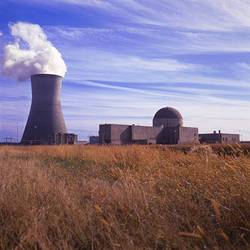New report details nuclear "sticker shock"
 A new study out of North Carolina details the sticker shock electric customers could experience if the state's two big utility companies move forward with plans to build four new nuclear reactors -- but it also offers ways to avoid it. The findings come as the industry's boosters in Congress are pushing ahead with plans to offer up to $50 billion in new nuclear subsidies.
A new study out of North Carolina details the sticker shock electric customers could experience if the state's two big utility companies move forward with plans to build four new nuclear reactors -- but it also offers ways to avoid it. The findings come as the industry's boosters in Congress are pushing ahead with plans to offer up to $50 billion in new nuclear subsidies.Written by the former chair of Duke University's Economics Department for utility watchdog group NC WARN, "North Carolina's Energy Future" shows that electricity from new nuclear plants -- with an estimated price tag of at least $8 billion each -- will cost three to five times as much as the power now being generated by Duke Energy and Progress Energy. It also points out that upcoming carbon regulation will drive up the price of coal power.
The report describes how the companies could reduce electricity demand by as much as 3,700 megawatts within 15 years, which would not only avoid the need for expensive new nuclear plants but also allow the companies to retire heavily polluting coal-fired units. That would entail doing four things:
* Stop impeding progress toward real energy efficiency. "Through proven programs growing at a modest pace, efficiency can be increase at least 1% per year through 2023," the report says.
* Bring on more renewable energy. "At least 7.5% of electricity from new renewable sources is well within reach," it says, "especially as prices for solar equipment continue declining and as North Carolina joins other mid-Atlantic states in developing its large wind energy potential."
* Make modest increases in load control programs to soften peak demands.
* Add some cogeneration, which uses the heat generated as a byproduct of electricity production for domestic or industrial heating. A proven resource, cogeneration is largely untapped in North Carolina.
The NC WARN report adds to a growing body of evidence documenting what a poor deal nuclear power represents for the public. One of the most detailed and devastating analyses is found in a 2008 report titled "The Nuclear Illusion" by Amory B. Lovins and Imran Sheikh of the Rocky Mountain Institute. That study put the cost of electricity from a new nuclear power plant at 14 cents per kilowatt hour compared to 7 cents per kilowatt hour from a wind farm, concluding that nuclear power is "so hopelessly uneconomic" that it's not even necessary to debate its serious safety issues.
In his paper titled "The Flawed Economics of Nuclear Power," Lester R. Brown of the Worldwatch Institute points out that Lovins' and Sheikh's analysis includes the costs of fuel, capital, operations, maintenance, transmission and distribution -- but doesn't include nuclear power's considerable costs for waste disposal, insuring plants against an accident, and decommissioning plants when they wear out.
"Given this huge gap, the so-called nuclear revival can succeed only by unloading these costs onto taxpayers," Brown writes. "If all the costs of generating nuclear electricity are included in the price to consumers, nuclear power is dead in the water."
Unfortunately, Congress has proven all too willing to unload nuclear power's exorbitant costs onto taxpayers. It's already offered $18.5 billion in taxpayer subsidies to new nuclear plants, and last week pro-nuclear lawmakers slipped an extra $50 billion for nuclear loan guarantees -- which would go to companies that default on their loans -- into the Senate's budget plan, the Washington Times reports:
Without debate, explanation or a recorded vote, senators accepted an amendment by Sen. Michael D. Crapo, Idaho Republican, to boost the department's "low-carbon" energy loan construction guarantee program by $50 billion over five years. The program would make it easier for the nuclear power industry to secure financing for plants, including the more than two dozen that are now pending.Sens. Byron Dorgan (D-N.D.) and George Voinovich (R-Ohio) also included the nuclear loan program expansion in an energy proposal they unveiled last week. The proposal was drawn up with help from Securing America's Future Energy (SAFE), a group led by business executives and retired military leaders that advocates for reduced reliance on foreign oil.
House leaders stripped the same loan-guarantee proposal from the earlier economic stimulus bill after environmental advocates denounced it as a "bailout" for the nuclear industry. Environmental groups say they will lobby against the plan again.
(Photo of Progress Energy's Shearon Harris nuclear power plant in Wake County, N.C. from the U.S. Nuclear Regulatory Commission's website)
Tags
Sue Sturgis
Sue is the former editorial director of Facing South and the Institute for Southern Studies.
